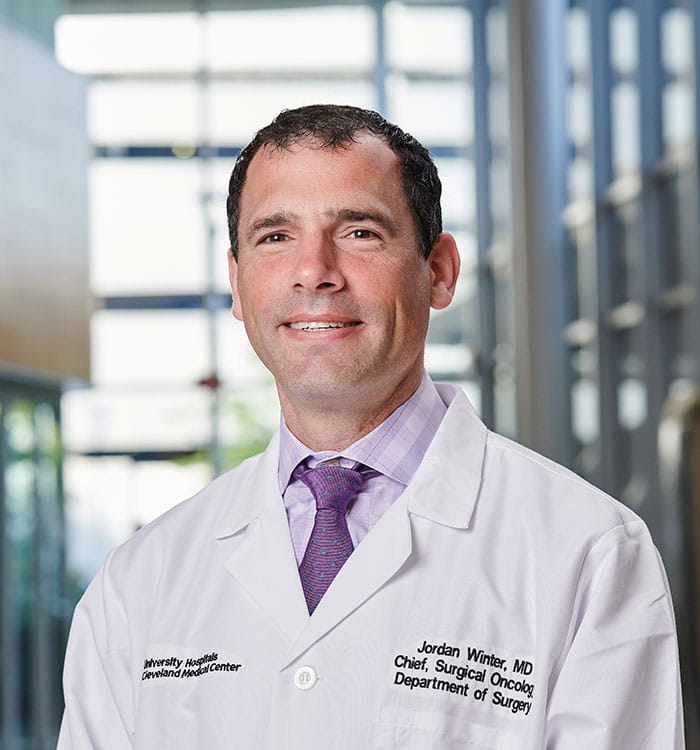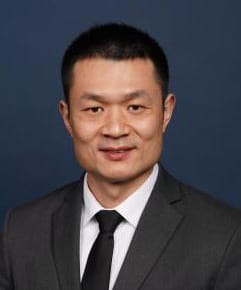U.S. Department of Defense Funds Promising UH/CWRU Pancreatic Cancer Research
November 16, 2023
Collaboration exploring the possible synergy of important individual discoveries
Innovations in Cancer | Fall 2023
Researchers from UH Seidman Cancer Center and Case Western Reserve University School of Medicine are pursuing a novel approach for attacking pancreatic cancer, with funding from the U.S. Department of Defense (DOD).
 Jordan Winter, MD
Jordan Winter, MDJordan Winter, MD, Chief of Surgical Oncology at UH Seidman, the John and Peggy Garson Family Endowed Chair in Pancreatic Cancer Research and the Jerome A. and Joy Weinberger Family Master Clinician in Surgical Oncology at UH, and his research team have identified an important molecular target in pancreatic cancer. The team has found that in pancreatic cancer cells, a metabolic enzyme called wild-type IDH1 enables the cells to adapt to the nutrient-deprived conditions in the tumor microenvironment. Importantly, however, they’ve also found that the drug approved by the U.S. Food and Drug Administration to target mutant IDH1 is also effective against the wild-type form of the enzyme, publishing their results in the prestigious journal Nature Cancer.
“In our study, we’ve shown that allosteric inhibitors of mutant IDH1 are potent wild-type inhibitors under conditions present in the tumor microenvironment,” Dr. Winter says. “We’ve demonstrated that low magnesium levels facilitate allosteric inhibition of wild-type IDH1, which is lethal to cancer cells when nutrients are limited. Furthermore, our data also shows that the FDA-approved mutant IDH1 inhibitor ivosidenib dramatically inhibits tumor growth in preclinical models of pancreatic cancer where magnesium levels are naturally low in tumors, highlighting this approach as a potential therapeutic strategy against wild-type IDH1 cancers.”
To date, ivosidenib has been used exclusively for cancers with mutant IDH1, Dr. Winter says – about 1 percent of cases. These new results raise the prospect that the drug could be effective for the remaining 99 percent of cancers that have wild-type IDH1 and that also exist in a low magnesium environment.
 Rui Wang, PhD
Rui Wang, PhDAt the same time, Dr. Winter is collaborating with Rui Wang, PhD, Assistant Professor of Surgery in the CWRU School of Medicine, to explore ways to further leverage these findings for patients with pancreatic cancer. For his part, Dr. Wang has shown that endothelial cells in the liver secrete factors that communicate with pancreatic cancer cells that have spread there, accelerating cancer growth. Activation of a surface protein called HER3 in metastatic pancreatic cancer cells underlies this process, which then cascades to other molecules to reprogram the metabolism of the tumor. But this, too, can be addressed with an existing drug, Dr. Wang says.
“Our data shows that blocking HER3 with seribantumab decreased pancreatic ductal adenocarcinoma (PDAC) cell growth, and switched cancer metabolism back to a ‘primary tumor-like’ biology that is maximally susceptible to an IDH1 inhibitor,” he says.
In their new joint DOD research project, Dr. Winter and Dr. Wang look to synergistically combine these important discoveries for the benefit of pancreatic cancer patients.
“We want to better understand how liver endothelial cells help PDAC cells grow and change cancer metabolism, especially in metastatic sites of spread,” Dr. Wang says. “Moreover, we will leverage these insights to combine two strategies that should cooperate to effectively treat both primary and metastatic PDAC. We will employ state-of-the-art techniques to determine the effects of liver endothelial cells and HER3/IDH1 inhibition on PDAC cell metabolism and survival, and will identify the pathways that drive those effects.”
“We will also determine if combining an anti-HER3 therapy, seribantumab, and an anti-IDH1 agent, ivosidenib, will lead to stronger anti-cancer effects in cell culture conditions,” adds Dr. Winter. “Additionally, we will employ a mouse model that closely replicates PDAC spread in humans, to study the effect of anti-HER3 therapy and anti-IDH1 therapy alone or in combination, on both primary and metastatic disease.”
Dr. Winter says he’s hopeful where the research is leading.
“If successful, this work can be rapidly translated into clinical trials to test a completely new strategy to treat PDAC, he says. “More importantly, we anticipate that these studies will identify a drug combination that is especially effective against metastatic pancreatic disease.”
Contributing Experts:
Jordan Winter, MD
Chief, Division of Surgical Oncology
UH Cleveland Medical Center
Director, Surgical Services
UH Seidman Cancer Center
John and Peggy Garson Family Endowed Chair in Pancreatic Cancer Research
Jerome A. and Joy Weinberger Family Master Clinician in Surgical Oncology
Professor of Medicine
Case Western Reserve University School of Medicine
Rui Wang, PhD
Assistant Professor of Surgery
Case Western Reserve University School of Medicine


